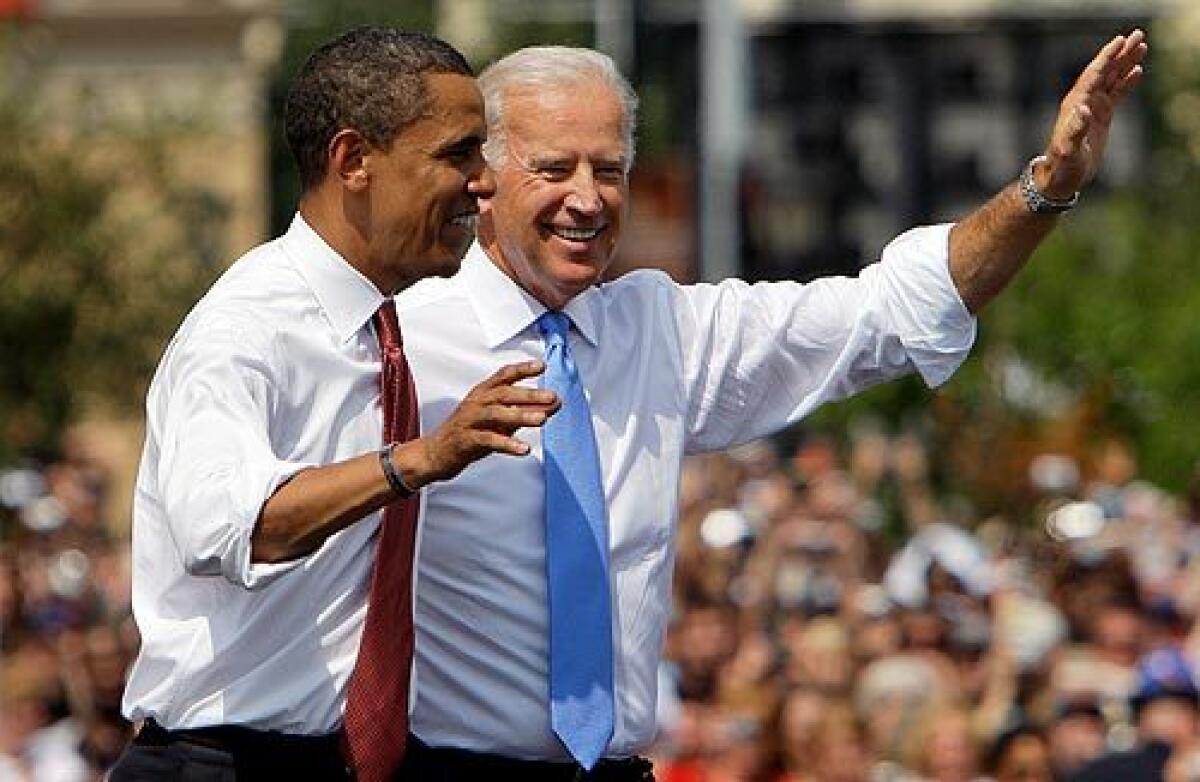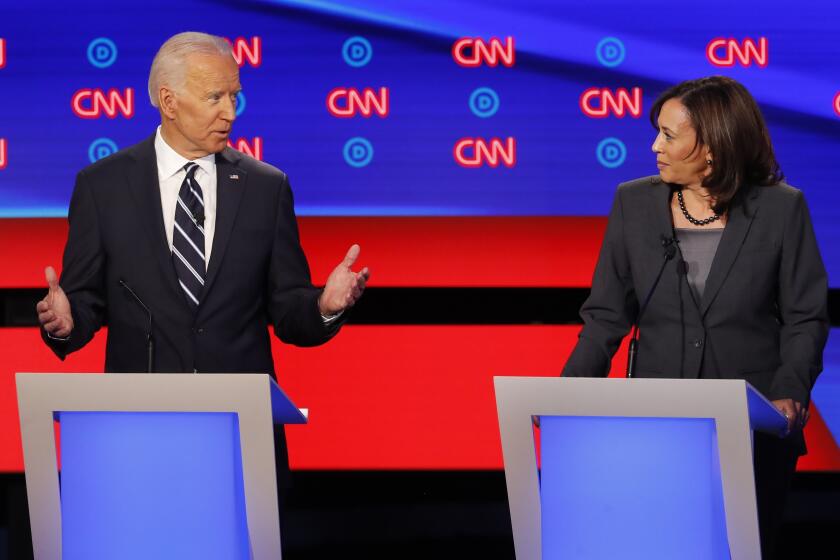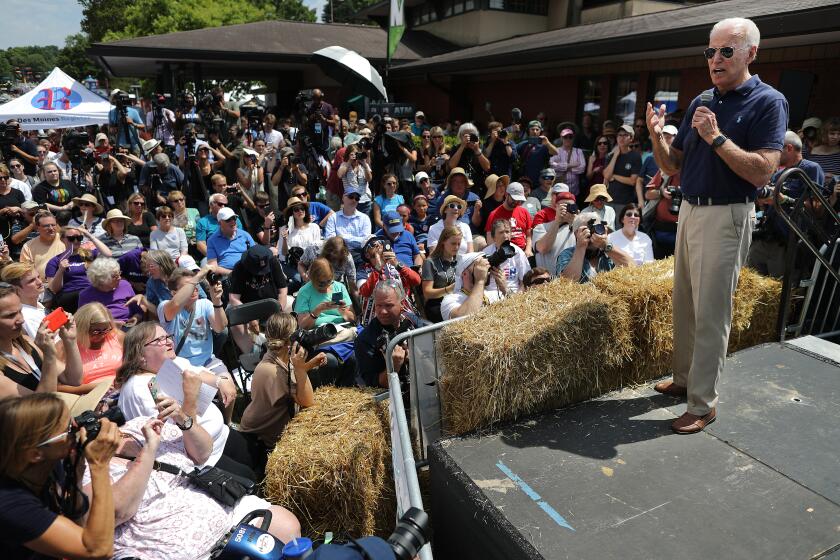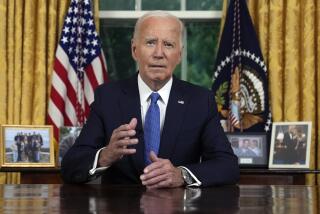From ‘shotgun wedding’ to political romance: How Obama picked Biden for vice president

- Share via
WASHINGTON — When his second presidential campaign collapsed in 2008 after a dismal showing in the Iowa caucuses, Joe Biden told reporters he had no interest in becoming someone else’s vice president. He’d have more influence as chairman of the Senate Foreign Relations Committee, he figured.
Eight months later, he stood as running mate to the Democrat who beat him: Barack Obama, a man far below him in the Senate pecking order, much younger and less experienced in world affairs.
As Biden describes the process leading to that moment, it sometimes sounds like a buddy movie. But the Obama-Biden relationship was more complicated. Their attitudes toward each other changed significantly from the end of Biden’s 2008 presidential race to his selection as vice president.
Now that experience is helping shape Biden’s course as he seeks to find his own running mate, even as Obama has started taking a higher-profile role in this year’s campaign.
At a recent virtual fundraiser, Biden outlined what he was looking for in a running mate: someone who is “simpatico” and “agrees strategically” with him and is ready to be president on “a moment’s notice.”
Biden has made clear that, like Obama, he’s looking for someone who will be a governing partner, not just a political asset — a criterion that, if he sticks with it, will be a strong determining factor in which person he picks.
“You’ve got to be able to turn and say to your vice president, ‘This is your responsibility.’” he said during one primary campaign event. Because the job of president “is too big anymore for any one man or woman.”
Biden now is considering an array of potential running mates with varying kinds and levels of governing experience — from state legislator to senator to governor — but none with a resume as long as Biden brought to Obama’s ticket.
But he’s also looking for qualities he lacks that could help him get elected — youth and energy that, in 2008, were well provided by the top of the ticket.
Obama’s choice altered the course of Biden’s late career. At age 66, having seen two presidential campaigns end in spectacular failure, he was likely to end his career as a Senate lifer. Obama resurrected his national profile and gave him the platform from which to launch another presidential bid.
In the months leading up to Obama’s decision, the two men took each other’s measure and got over their prickly first impressions.
David Axelrod, a longtime top advisor to Obama, compared the evolution of their relationship to a “shotgun wedding” that turned into a love story, because initial wariness eventually gave way to deep trust and respect.
“There were good reasons for Obama to name Biden, but it wasn’t based on closeness,” Axelrod said in an interview. “Most of these shotgun weddings go badly. Rarely do they leave the White House as good friends. This is a wonderful aberration.”
Some supporters worry that in looking for a “simpatico” running mate, Joe Biden will be too cautious and make a choice that fails to excite voters.
Biden’s selection by Obama makes so much sense in retrospect, it’s easy to forget how little love was lost between them at first and what a big leap it was for Biden to agree to be somebody’s wingman for the first time in his life.
Biden had been climbing the seniority ladder of the Senate for a generation when Obama was elected to the Senate in 2004. Obama swept onto Capitol Hill already a celebrity from his well-received speech at the Democratic National Convention that year and from his bestselling memoir.
In an early encounter with Obama mentioned in his own memoir, “Promise Me, Dad,” Biden saw a touch of arrogance: When Biden proposed they meet for dinner at a modest restaurant, Obama mentioned his book royalties and said, “Oh, we can go to a nice place. I can afford it.”
Obama became the most junior member of the Foreign Relations Committee, where Biden was top Democrat. That meant Obama was the last to question witnesses, which tested the patience of the ambitious young senator. At one of his first hearings, during a particularly long-winded speech by Biden, Obama passed a note to an aide: “Kill. Me. Now.”
In the 2008 presidential campaign, they saw each other in a very different context: Obama quickly emerged as a political phenom with charisma and a killer organizing program. Biden was an old-school pol who stumbled on the first day of his candidacy by calling Obama the “first sort of mainstream African American who is articulate and bright and clean” to run for president.
In a candidate debate in 2007, Biden said he did not think Obama was ready to be president.
Iowa voters thought otherwise. Obama won the caucuses handily, and Biden earned fewer than 1% of the delegates. He dropped out of the race the next day.
Joe Biden lost Iowa badly when he ran for president in 2008. He’s working hard to make sure it doesn’t happen again in 2020 — and having been Obama’s vice president helps a lot.
“It was really clear. ... We all felt that was his last presidential race,” said Ted Kaufman, a longtime Biden advisor who succeeded him in the Senate. “He had his life planned out for himself: being chairman of the Senate Foreign Relations Committee and putting his heart and soul into doing that.”
But Obama had been impressed with Biden’s debate performance. (One highlight: Speaking of former New York Mayor Rudy Giuliani, who was running for president and touting his leadership after the Sept. 11, 2001, attacks, Biden quipped: “There’s only three things he mentions in a sentence: a noun, a verb and 9/11.”)
Axelrod said Biden’s name was the first Obama mentioned when he started talking about a running mate, citing his experience in Washington and on the campaign trail.
Biden’s long Washington resume would provide Obama both political and governing advantages. He reassured voters nervous about electing a young black man with little governing experience. And Biden was well equipped to help manage relations with Congress and world leaders.
But when Obama first called to say he wanted to consider him, Biden said he wasn’t interested, he recounts in his memoir. Kaufman also was not keen on the idea.
“Look, you’re really happy with what you are doing,” he recalls telling Biden. “Really, at this point in your career, do you want to become vice president and work for somebody else?”
But Biden’s mother wanted him to go for it. “So let me get this straight, honey. The first African American in history who has a chance to be president says he needs your help to win — and you said ‘no’?” Biden recalls her saying.
Biden struggled with the prospect of playing second fiddle and with the stereotype of vice presidents as powerless figureheads.
“I never had a boss,” he told his wife. “I don’t know how I’d handle it.”
“C’mon, Joe. Grow up,” Jill Biden responded. He agreed to undergo the vetting process.
But Biden kept airing reservations even when Axelrod and Obama campaign manager David Plouffe traveled to Delaware to do a final interview at the home of Biden’s sister.
“The last thing I should do is VP after 36 years of being top dog, it will be hard to be No. 2,” he said, according to Plouffe’s memoir, “The Audacity to Win.”
Biden was picked over two other finalists — Sen. Evan Bayh of Indiana and Tim Kaine, who was then governor of Virginia. Obama advisors describe it as a choice of head over heart — pragmatic calculation over personal preference.
“It ended up a very good marriage, but it was a very tough pick; it was not an obvious pick at the time,” said former Obama advisor Jim Messina, who noted that, of the three finalists, Obama was closest to Kaine. “They had more in common.”
It was not easy for Biden to make the transition from Senate committee baron to campaign understudy. He had to adapt to the role of defending someone else’s positions and making him look good. He initially bridled at getting daily marching orders from Plouffe and Axelrod.
“That was a tough road,” Kaufman said, “but he did it.”
Biden’s volubility and tendency to wander off script annoyed the famously disciplined Obama team — and never more so than when, at a late October fundraiser, Biden told supporters to “gird their loins” for an international crisis that would “test the mettle of this guy.”
“Mark my words: It will not be six months before the world tests Barack Obama like they did John Kennedy,” Biden said.
Although Biden went on to praise the nominee, Obama and his advisors were furious because they believed Biden’s comment fueled the Republican argument that Obama was not experienced enough to be president, Axelrod said, adding that Biden sent a message, “Don’t worry, I’ve got this, I’m there to help.”
In the end, aides to both men said, their relationship stabilized and grew close because Biden had asked for and Obama granted him an extraordinary level of involvement in policy making and decision making. That began soon after the inauguration, with Biden taking the lead on the administration’s first legislative initiative, an economic stimulus plan.
During his interview with Obama for the job, when asked what policy areas he would like to lead on, Biden said all of them.
“I want to be the last guy in the room on every major decision,” he said. Obama agreed, Biden said, and kept his word “all the way through to the end.”
More to Read
Get the L.A. Times Politics newsletter
Deeply reported insights into legislation, politics and policy from Sacramento, Washington and beyond. In your inbox twice per week.
You may occasionally receive promotional content from the Los Angeles Times.













